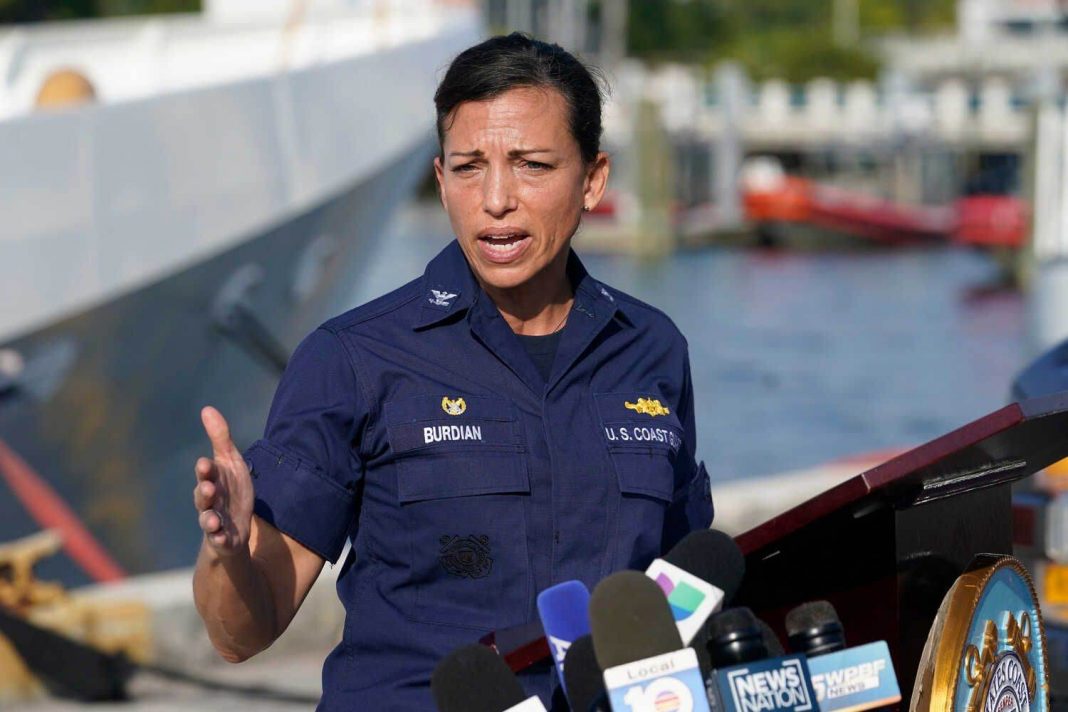After a boat wrecked in the Florida Straits over the weekend, the chances of survival for dozens of migrants were becoming more poor on Wednesday, according to the United States Coast Guard, which resumed its search for 38 individuals.
During a press conference on Wednesday, Capt. Jo-Ann F. Burdian, commander of the Coast Guard’s Miami area, described the situation as “disastrous.” “The longer they stay in the water, without food or drink, the colder it becomes, along with the marine environment, the sun, and the weather conditions. The situation is becoming more bad, and it is becoming increasingly improbable that anybody will live.”
Approximately 8 a.m. on Tuesday, a commercial mariner reported witnessing a 25-foot boat capsize approximately 40 miles east of Fort Pierce, Florida. The search effort started immediately. A survivor was rescued from the hull by a tug and a barge. He was transferred to a hospital where he was treated for dehydration and exposure to the sunlight.
It was revealed to the authorities that the individual, whose country was not disclosed, had departed the island of Bimini, in the Bahamas, on Saturday night with 39 other persons. The vessel went down soon after departing in stormy weather that featured a strong cold front, waves up to nine feet high, and winds gusting to 23 miles per hour. There were no life jackets on the water.
Human smuggling over international boundaries by water has increased in recent years, particularly on the east and west coasts of the United States. The Coast Guard has at times apprehended more than 100 Cubans, Dominicans, and Haitians crowded aboard a single boat in stormy Florida seas, according to reports. In addition, smuggling networks have transported swarms of illegal immigrants from Yemen, Mexico, and Central America on ships heading from Mexico to Southern California, according to reports.
She said that the Coast Guard had searched around 7,500 nautical miles so far, an area roughly equivalent to the size of New Jersey. The search was still ongoing on Wednesday, but authorities indicated they would have to call off the operation at some point since the prospects of survival were becoming increasingly poor.
“Everything is a little hazy right now,” said Keith Bell, the Bahamas’ minister of immigration and nationality. “We are in contact with our colleagues in the United States, and we are also in contact with the Ministry of National Security to see what information is available, simply to corroborate whether or not it did, in fact, originate in Bimini and who these individuals were.”
The current increase in sea smuggling of migrants to Florida and California has come as a result of technological advancements along the country’s land borders, which have made it more difficult to evade detection.
The number of Cubans embarking on the risky voyage is far lower than the vast numbers that came prior to January 2017, when the Obama administration stopped the programme that enabled Cubans to stay legally in the United States after they crossed the border into American territory. However, as economic hardship on the Caribbean island worsens, the number of those infected is increasing rapidly.
Coast Guard personnel have arrested 155 Dominicans and 129 Haitians near Puerto Rico since the beginning of October, with hundreds more expected to be apprehended throughout the fiscal year 2021. At the end of September, the Coast Guard intercepted a boat carrying 104 Haitian migrants who were crammed into a space less than 20 miles from Miami and rescued them.
According to U.S. Customs and Border Protection, apprehensions of migrants and smugglers at sea in California almost quadrupled between fiscal years 2019 and 2020, and they have continued to grow in fiscal year 2021, with 1,460 apprehensions as of July, according to the agency.
Smugglers on the West Coast often employ primitive flat-bottomed fishing boats, known as pangas, to transport migrants to and from the beaches of Baja California, a Mexican state located just south of the United States border. The government has attempted to mix with visitors by deploying pleasure boats, but this has been unsuccessful.
In the month of August, the Border Patrol reported thwarting six distinct marine smuggling efforts over the course of two weeks. A series of Pangas have managed to make landfall unnoticed throughout the California coast, extending from San Diego all the way up to Newport Beach in Orange County and Long Beach and Malibu in Los Angeles County.
A large number of smuggling operations have originated on the East Coast and have come from Bimini, a series of tiny islands in the Bahamas with a population of less than 2,000 people. They are the most closely associated inhabited islands with the United States of America.
The majority of those who have sailed from there are Haitian migrants, although inhabitants claim that the operations are clandestine and that they are seldom recognised on the mainland. “It’s not something you see in the neighbourhood; you just hear about it.” “It’s hardly even visible,” said Robbie Smith, a former chief councillor on the island of Bimini. They’re doing it at night while people are asleep, if that’s what they’re doing.”

